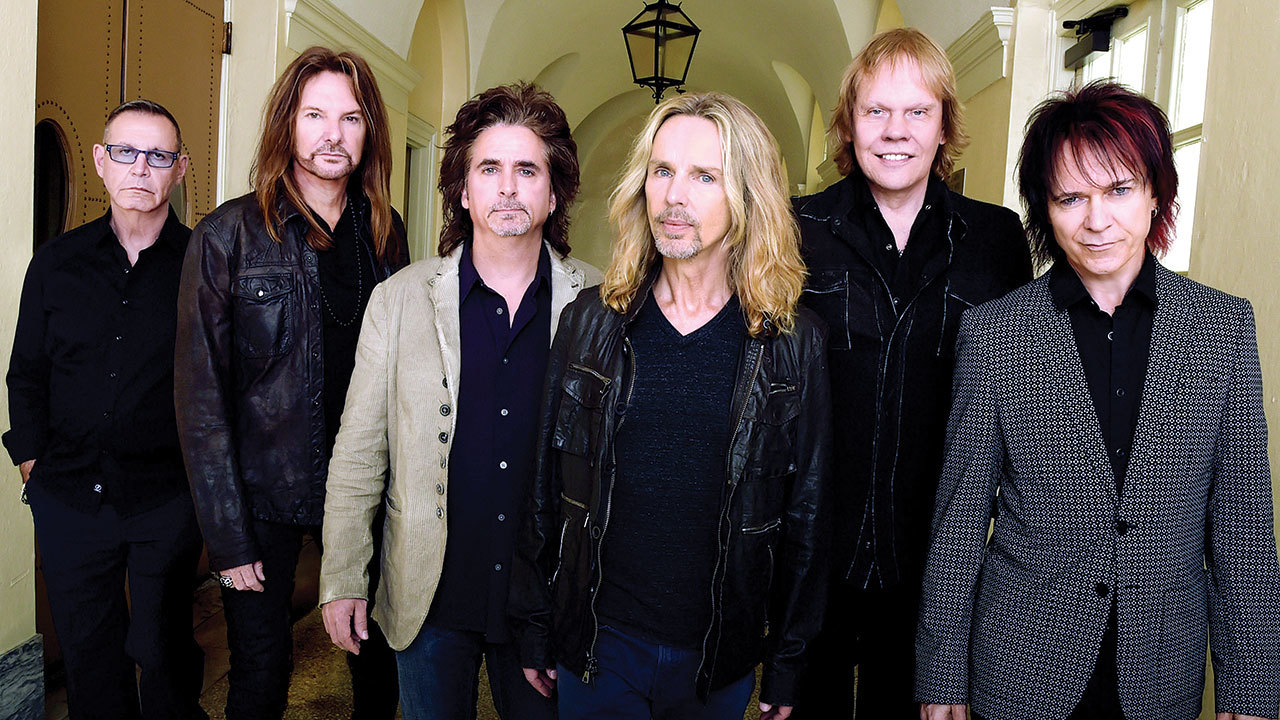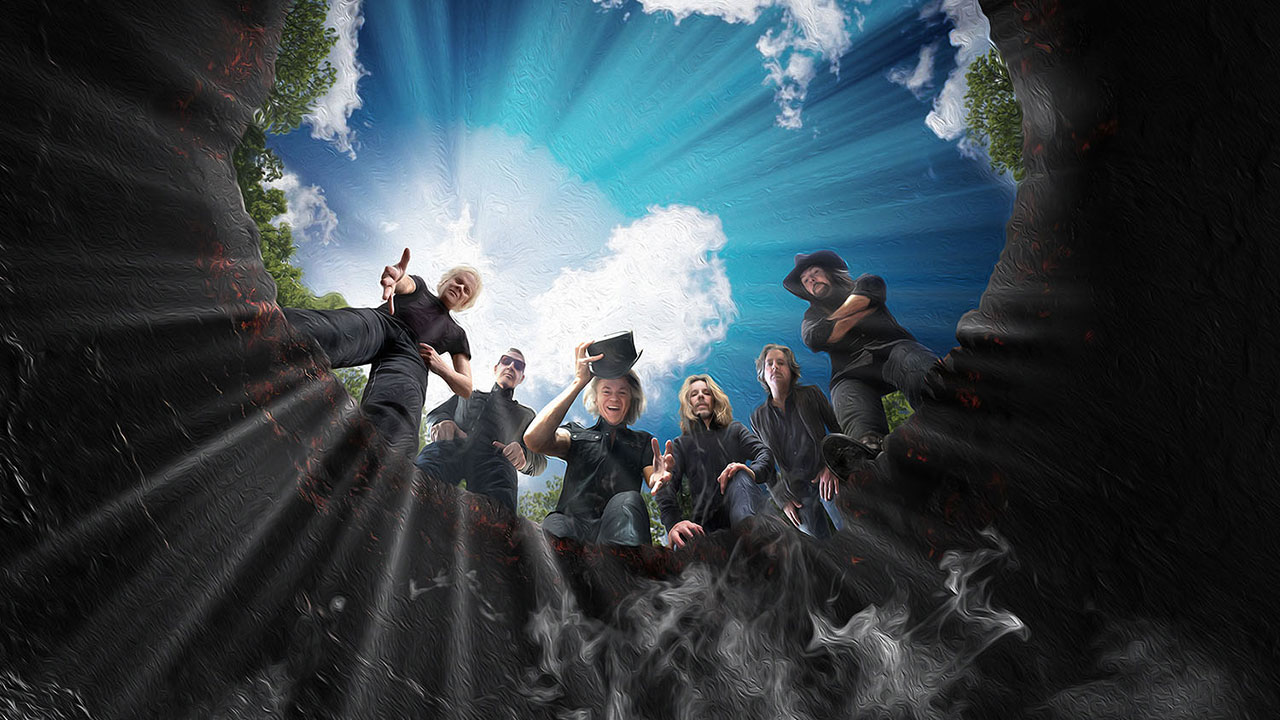Though the fact wasn’t always evident progressive rock has provided the backbone of Styx’s music for almost fifty years. The Chicago-based group are better known for notching hits with saccharine-soaked hit ballads such as Babe, The Best Of Times and Boat On The River, but last issue co-founding keyboardist Dennis DeYoung told Prog how our genre’s influence guided their earliest years, revealing: “Yes had a profound experience on all of us in Styx.”
Styx and DeYoung parted ways acrimoniously in 1999, but he left behind a glittering pomp-rock legacy defined by three landmark triple-platinum-selling statements; 1977’s The Grand Illusion, ’78’s Pieces Of Eight and Paradise Theater in 1981 (just for good measure, 1979’s Cornerstone also sold a cool two-million copies). In opting to replace DeYoung, Styx chose a precocious, locally established solo artist from Canada with a strong affinity for progressive music.
“It was the prog side of Styx that made we want to join the band,” Lawrence Gowan explains. “To my mind they were the first non-British prog act. The prog elements in their early music made me sit up and think: ‘Wow, those guys are from Chicago’. When I became part of Styx I wanted to embrace that – to a degree, at least.”
Glasgow-born but raised in Ontario, Gowan’s prog journey began at the age of 14 after borrowing a school friend’s copy of Fragile by Yes. “It launched me into a whole new world, and from there I discovered Jethro Tull, Genesis and ELP.”
After the break-up of his band Rhinegold, Gowan made six records of his own that featured the talents of Robert Fripp, Tony Levin, Alex Lifeson, the Peter Gabriel associates David Rhodes and Jerry Marotta and Jon Anderson. “Jon and I went to the pyramids in Mexico to make a video for the song Moonlight Desires,” he relates excitedly. “That was a complete thrill.”
Despite his longevity in the role, the arrival of the flamboyant Gowan in Styx has been something of a Marmite appointment. Onstage, Lawrence is a blur of activity, spinning his keys and prowling the stage. “If people consider me a show-off, I’m not in the least bit bothered,” he laughs. “The first time I saw Rick Wakeman I realised you could play the piano and be a super-hero. In their own way Wakeman and Keith Emerson were frontmen, just like Elton John and Freddie Mercury. I’ve always been drawn to that kind of performance.”
By complete contrast, 46 years into his career with Styx, Tommy Shaw is a self-confessed “student of prog.” The Alabama-born guitarist/vocalist, who joined as replacement for John Curulewski just before the band broke big with their sixth album, 1976’s Crystal Ball, came from a background as a mellower, Crosby, Stills, Nash & Young-style singer/songwriter.
“I don’t know that I’m a prog-rock fanatic because, honestly, Styx was the first rock band I was in,” Shaw admits. “Everything I know about prog came from Will [Evankovic, producer, songwriter and musician] and Todd [Sucherman, the band’s drummer since 1995]. They ushered me into the usage of these different time signatures.”
It was being part of a North American tour with Yes that really opened Shaw’s eyes to the possibilities of the genre. Over the summer of 2011 the two acts became fast friends.
“That tour was like taking a trip to another dimension,” Tommy smiles. “I watched Yes from the side of the stage every night. I remember that during a gig at the Shoreline Amphitheatre in San Francisco I surprised Chris Squire by taking his bass from a roadie during a guitar-change and presenting it to him between songs. That was hilarious. Later on he did the same thing to me.”
With the band’s fortunes as a recording act having looked ever more doubtful during the current millennium, Will Evankovic enabled the reinvention of Styx, playing a pivotal role in their last two records, The Mission in 2017, and the brand-new Crash Of The Crown.
The group’s first collection of original material in 14 years, The Mission, which related the sci-fi tale of a voyage to the planet Mars in the year 2033, put Styx back on the map in no uncertain terms. Crash Of The Crown is also conceptual and, if anything, sees the band ramping up the levels of pomp drama.
“This new record is far more proggy than The Mission,” acknowledges Gowan with evident pride. “It isn’t simply traditional radio-friendly rock.”
The Canadian’s unapologetically lavish ivories are plastered all over the album’s 15 songs. “It can be tough to weave keyboards in between the double-guitar onslaught of Tommy [Shaw] and James ‘JY’ Young, but we managed that,” he reflects. “And at last I got to use the vintage Mellotron that I had owned for ten years at the end of the title track.”

Crash Of The Crown was recorded at Tommy’s home studio in Nashville. Its contents had largely been written before the world changed through Covid-19, with the lion’s share of its parts completed in isolation.
“It’s a friendly place to work, and despite the restrictions we found a comfortable way to make music with people flying in and recording their parts before it was the turn of the next person,” Shaw explains. “Everyone feels at home here.”
The songs Our Wonderful Lives and Lost At Sea feature bass guitar parts from co-founding member Chuck Panozzo, who since 1991 has lived with HIV which progressed into AIDS. Replaced by former The Babys/Bad English man Ricky Phillips in 2003, Panozzo continues to make guest appearances on record and on stage. Wary of the virus, made the 900-mile return journey to Nashville by car from his home in Miami.
“There’s one thing for sure – Chuck Panozzo will always be on any new Styx album,” Shaw chuckles fondly. “Chuck is a joy; we call him the Iron Man because he’s indestructible.”
The record trumpets what its biography calls an overall theme of “a new era of hope, survival, and prosperity.” Its central theme of positivity had already been well defined, but as Shaw admits: “The record took a different turn when Covid hit.”
“Life can be hopeless and tragic, but what my mother always told me as a kid remains true: Tomorrow the sun will come up for the start of a new day,” he says. “Music can provide hope.”
Also according to the promotional blub, the album was inspired by events that took place in 1066, 1455, 1775, 1861 and 2001. We know that was on Styx’s mind with Save Us From Ourselves which samples Churchill’s legendary “We shall fight on the beaches” speech from World War II, but Shaw, who along with Gowan and Evankovic, wrote the lyrics, is reluctant to spill the beans about their individual stories. “I like people to pick their own meanings for the songs,” he comments.
Even if they happen to get them wrong?
“Those theories are never wrong,” Tommy fires back immediately. “That’s the nice thing about music.”
For the first time since Styx II way back in 1973, guitarist James ‘JY’ Young had no compositional input. Young has never been one of the group’s main writers but did the exclusion put his nose out of joint?
“No, not at all,” Shaw insists. “He loved what we were doing [without him]. “If you listen to his part of the song Crash Of The Crown [which, for the first time in the band’s history is sung by three vocalists; Young, Shaw and then Gowan in his best Freddie Mercury voice], to me that sounds like JY talking to his wife Susan. The thrill of JY singing makes me tear up. He always brings the magic. The guy lives in his own atmosphere but you can always count on him.”

In conversation with Shaw and Gowan, the glowing happiness of the pair is unmistakable. Tommy brings up the subject himself.
“A few years ago this band finally got happy,” he announces. “There used to be this discourse [with DeYoung], but Lawrence is such a disciple of fun and laughter. He has brought freshness and a joy that we never expected.”
Given the popularity and importance to his illustrious predecessor, does Gowan – now into his 22nd year with the band – feel fully established as the keyboard player of Styx?
“I feel that the current Styx is a culmination of everyone who’s ever been in the band, and I include John Panozzo [the group’s original drummer who died in 1996], John Curulewski and Dennis in that,” he replies. “With our fiftieth year coming up, there have only been ten people in the band and each was pretty much unique.
“I’m very proud of my own era of Styx because if we didn’t make the change in 1999 the band was pretty much over,” he continues. “For Styx to survive we had to play no less than a hundred shows per year. We did that, and since then we’ve played well over two thousand shows around the world.”
Before this interview we had been warned not to mention DeYoung’s name or discuss the possibility of a reunion, though the fact that Dennis happens to be releasing the second part of his farewell album, 26 East, at the same time as Styx unveiled their own record makes such demands impossible – also given the fact that last month Dennis had told Prog that Shaw was personally responsible for blocking any such notion.
“Whatever reason Dennis isn’t in the band, it isn’t my fault,” Tommy replies wearily. “I wish him the best, but the band was going nowhere. Dennis would rather that the band stopped, and the rest of us didn’t feel that way. I haven’t spoken to him for 22 years, but there’s nothing new to say. Dennis makes a lot of statements but I don’t read them. I would say to him, go with God and have a good life.”
While DeYoung is retiring, it’s clear that Styx have no such intention.
“And do what?” Shaw laughs. “I’ve been stuck at home for a year, getting pissed off and wearing sweatpants. I’ve missed the fulfilment of it all.”
Styx, who commence touring again Stateside on June 18, played London’s Palladium for The Mission, and both Tommy and Larry say they would love to return. “We’re all Beatles fans, so playing that place was a dream come true,” comments Shaw.
Declaring the will to continue as a working band is one thing, but how long much longer Styx might withstand the physical demands of the road is quite another.
“As long as we can stand on our own two feet, and so long as our voices hold up – which they are doing – then we have no reason to stop,” Shaw concludes. “The way I feel right now, I wouldn’t mind taking my last breath on a stage with Styx.”

